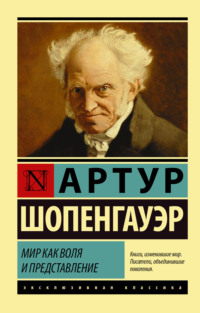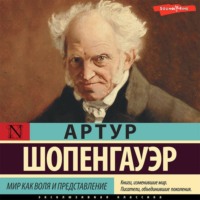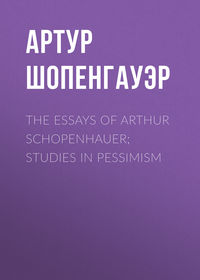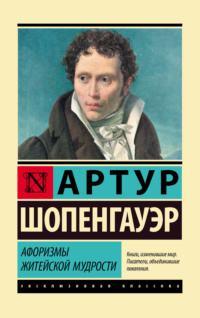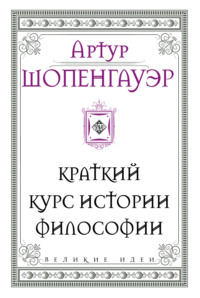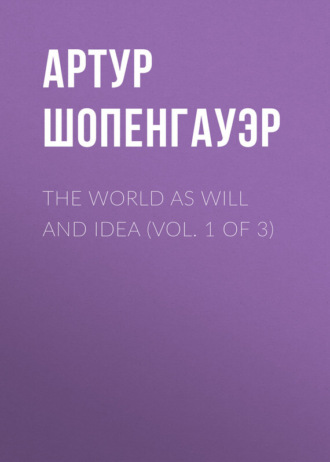 полная версия
полная версияThe World as Will and Idea (Vol. 1 of 3)
Thus everywhere in nature we see strife, conflict, and alternation of victory, and in it we shall come to recognise more distinctly that variance with itself which is essential to the will. Every grade of the objectification of will fights for the matter, the space, and the time of the others. The permanent matter must constantly change its form; for under the guidance of causality, mechanical, physical, chemical, and organic phenomena, eagerly striving to appear, wrest the matter from each other, for each desires to reveal its own Idea. This strife may be followed through the whole of nature; indeed nature exists only through it: ει γαρ μη ην το νεικος εν τοις πραγμασιν, ἑν αν ην ἁπαντα, ὡς φησιν Εμπεδοκλης; (nam si non inesset in rebus contentio, unum omnia essent, ut ait Empedocles. Aris. Metaph., B. 5). Yet this strife itself is only the revelation of that variance with itself which is essential to the will. This universal conflict becomes most distinctly visible in the animal kingdom. For animals have the whole of the vegetable kingdom for their food, and even within the animal kingdom every beast is the prey and the food of another; that is, the matter in which its Idea expresses itself must yield itself to the expression of another Idea, for each animal can only maintain its existence by the constant destruction of some other. Thus the will to live everywhere preys upon itself, and in different forms is its own nourishment, till finally the human race, because it subdues all the others, regards nature as a manufactory for its use. Yet even the human race, as we shall see in the Fourth Book, reveals in itself with most terrible distinctness this conflict, this variance with itself of the will, and we find homo homini lupus. Meanwhile we can recognise this strife, this subjugation, just as well in the lower grades of the objectification of will. Many insects (especially ichneumon-flies) lay their eggs on the skin, and even in the body of the larvæ of other insects, whose slow destruction is the first work of the newly hatched brood. The young hydra, which grows like a bud out of the old one, and afterwards separates itself from it, fights while it is still joined to the old one for the prey that offers itself, so that the one snatches it out of the mouth of the other (Trembley, Polypod., ii. p. 110, and iii. p. 165). But the bulldog-ant of Australia affords us the most extraordinary example of this kind; for if it is cut in two, a battle begins between the head and the tail. The head seizes the tail with its teeth, and the tail defends itself bravely by stinging the head: the battle may last for half an hour, until they die or are dragged away by other ants. This contest takes place every time the experiment is tried. (From a letter by Howitt in the W. Journal, reprinted in Galignani's Messenger, 17th November 1855.) On the banks of the Missouri one sometimes sees a mighty oak the stem and branches of which are so encircled, fettered, and interlaced by a gigantic wild vine, that it withers as if choked. The same thing shows itself in the lowest grades; for example, when water and carbon are changed into vegetable sap, or vegetables or bread into blood by organic assimilation; and so also in every case in which animal secretion takes place, along with the restriction of chemical forces to a subordinate mode of activity. This also occurs in unorganised nature, when, for example, crystals in process of formation meet, cross, and mutually disturb each other to such an extent that they are unable to assume the pure crystalline form, so that almost every cluster of crystals is an image of such a conflict of will at this low grade of its objectification; or again, when a magnet forces its magnetism upon iron, in order to express its Idea in it; or when galvanism overcomes chemical affinity, decomposes the closest combinations, and so entirely suspends the laws of chemistry that the acid of a decomposed salt at the negative pole must pass to the positive pole without combining with the alkalies through which it goes on its way, or turning red the litmus paper that touches it. On a large scale it shows itself in the relation between the central body and the planet, for although the planet is in absolute dependence, yet it always resists, just like the chemical forces in the organism; hence arises the constant tension between centripetal and centrifugal force, which keeps the globe in motion, and is itself an example of that universal essential conflict of the manifestation of will which we are considering. For as every body must be regarded as the manifestation of a will, and as will necessarily expresses itself as a struggle, the original condition of every world that is formed into a globe cannot be rest, but motion, a striving forward in boundless space without rest and without end. Neither the law of inertia nor that of causality is opposed to this: for as, according to the former, matter as such is alike indifferent to rest and motion, its original condition may just as well be the one as the other, therefore if we first find it in motion, we have just as little right to assume that this was preceded by a condition of rest, and to inquire into the cause of the origin of the motion, as, conversely, if we found it at rest, we would have to assume a previous motion and inquire into the cause of its suspension. It is, therefore, not needful to seek for a first impulse for centrifugal force, for, according to the hypothesis of Kant and Laplace, it is, in the case of the planets, the residue of the original rotation of the central body, from which the planets have separated themselves as it contracted. But to this central body itself motion is essential; it always continues its rotation, and at the same time rushes forward in endless space, or perhaps circulates round a greater central body invisible to us. This view entirely agrees with the conjecture of astronomers that there is a central sun, and also with the observed advance of our whole solar system, and perhaps of the whole stellar system to which our sun belongs. From this we are finally led to assume a general advance of fixed stars, together with the central sun, and this certainly loses all meaning in boundless space (for motion in absolute space cannot be distinguished from rest), and becomes, as is already the case from its striving and aimless flight, an expression of that nothingness, that failure of all aim, which, at the close of this book, we shall be obliged to recognise in the striving of will in all its phenomena. Thus boundless space and endless time must be the most universal and essential forms of the collective phenomena of will, which exist for the expression of its whole being. Lastly, we can recognise that conflict which we are considering of all phenomena of will against each other in simple matter regarded as such; for the real characteristic of matter is correctly expressed by Kant as repulsive and attractive force; so that even crude matter has its existence only in the strife of conflicting forces. If we abstract from all chemical differences in matter, or go so far back in the chain of causes and effects that as yet there is no chemical difference, there remains mere matter, – the world rounded to a globe, whose life, i. e., objectification of will, is now constituted by the conflict between attractive and repulsive forces, the former as gravitation pressing from all sides towards the centre, the latter as impenetrability always opposing the former either as rigidity or elasticity; and this constant pressure and resistance may be regarded as the objectivity of will in its very lowest grade, and even there it expresses its character.
We should see the will express itself here in the lowest grade as blind striving, an obscure, inarticulate impulse, far from susceptible of being directly known. It is the simplest and the weakest mode of its objectification. But it appears as this blind and unconscious striving in the whole of unorganised nature, in all those original forces of which it is the work of physics and chemistry to discover and to study the laws, and each of which manifests itself to us in millions of phenomena which are exactly similar and regular, and show no trace of individual character, but are mere multiplicity through space and time, i. e., through the principium individuationis, as a picture is multiplied through the facets of a glass.
From grade to grade objectifying itself more distinctly, yet still completely without consciousness as an obscure striving force, the will acts in the vegetable kingdom also, in which the bond of its phenomena consists no longer properly of causes, but of stimuli; and, finally, also in the vegetative part of the animal phenomenon, in the production and maturing of the animal, and in sustaining its inner economy, in which the manifestation of will is still always necessarily determined by stimuli. The ever-ascending grades of the objectification of will bring us at last to the point at which the individual that expresses the Idea could no longer receive food for its assimilation through mere movement following upon stimuli. For such a stimulus must be waited for, but the food has now come to be of a more special and definite kind, and with the ever-increasing multiplicity of the individual phenomena, the crowd and confusion has become so great that they interfere with each other, and the chance of the individual that is moved merely by stimuli and must wait for its food would be too unfavourable. From the point, therefore, at which the animal has delivered itself from the egg or the womb in which it vegetated without consciousness, its food must be sought out and selected. For this purpose movement following upon motives, and therefore consciousness, becomes necessary, and consequently it appears as an agent, μηχανη, called in at this stage of the objectification of will for the conservation of the individual and the propagation of the species. It appears represented by the brain or a large ganglion, just as every other effort or determination of the will which objectifies itself is represented by an organ, that is to say, manifests itself for the idea as an organ.36 But with this means of assistance, this μηχανη, the world as idea comes into existence at a stroke, with all its forms, object and subject, time, space, multiplicity, and causality. The world now shows its second side. Till now mere will, it becomes also idea, object of the knowing subject. The will, which up to this point followed its tendency in the dark with unerring certainty, has at this grade kindled for itself a light as a means which became necessary for getting rid of the disadvantage which arose from the throng and the complicated nature of its manifestations, and which would have accrued precisely to the most perfect of them. The hitherto infallible certainty and regularity with which it worked in unorganised and merely vegetative nature, rested upon the fact that it alone was active in its original nature, as blind impulse, will, without assistance, and also without interruption, from a second and entirely different world, the world as idea, which is indeed only the image of its own inner being, but is yet of quite another nature, and now encroaches on the connected whole of its phenomena. Hence its infallible certainty comes to an end. Animals are already exposed to illusion, to deception. They have, however, merely ideas of perception, no conceptions, no reflection, and they are therefore bound to the present; they cannot have regard for the future. It seems as if this knowledge without reason was not in all cases sufficient for its end, and at times required, as it were, some assistance. For the very remarkable phenomenon presents itself, that the blind working of the will and the activity enlightened by knowledge encroach in a most astonishing manner upon each other's spheres in two kinds of phenomena. In the one case we find in the very midst of those actions of animals which are guided by perceptive knowledge and its motives one kind of action which is accomplished apart from these, and thus through the necessity of the blindly acting will. I refer to those mechanical instincts which are guided by no motive or knowledge, and which yet have the appearance of performing their work from abstract rational motives. The other case, which is opposed to this, is that in which, on the contrary, the light of knowledge penetrates into the workshop of the blindly active will, and illuminates the vegetative functions of the human organism. I mean clairvoyance. Finally, when the will has attained to the highest grade of its objectification, that knowledge of the understanding given to brutes to which the senses supply the data, out of which there arises mere perception confined to what is immediately present, does not suffice. That complicated, many-sided, imaginative being, man, with his many needs, and exposed as he is to innumerable dangers, must, in order to exist, be lighted by a double knowledge; a higher power, as it were, of perceptive knowledge must be given him, and also reason, as the faculty of framing abstract conceptions. With this there has appeared reflection, surveying the future and the past, and, as a consequence, deliberation, care, the power of premeditated action independent of the present, and finally, the full and distinct consciousness of one's own deliberate volition as such. Now if with mere knowledge of perception there arose the possibility of illusion and deception, by which the previous infallibility of the blind striving of will was done away with, so that mechanical and other instincts, as expressions of unconscious will, had to lend their help in the midst of those that were conscious, with the entrance of reason that certainty and infallibility of the expressions of will (which at the other extreme in unorganised nature appeared as strict conformity to law) is almost entirely lost; instinct disappears altogether; deliberation, which is supposed to take the place of everything else, begets (as was shown in the First Book) irresolution and uncertainty; then error becomes possible, and in many cases obstructs the adequate objectification of the will in action. For although in the character the will has already taken its definite and unchangeable bent or direction, in accordance with which volition, when occasioned by the presence of a motive, invariably takes place, yet error can falsify its expressions, for it introduces illusive motives that take the place of the real ones which they resemble;37 as, for example, when superstition forces on a man imaginary motives which impel him to a course of action directly opposed to the way in which the will would otherwise express itself in the given circumstances. Agamemnon slays his daughter; a miser dispenses alms, out of pure egotism, in the hope that he will some day receive an hundred-fold; and so on.
Thus knowledge generally, rational as well as merely sensuous, proceeds originally from the will itself, belongs to the inner being of the higher grades of its objectification as a mere μηχανη, a means of supporting the individual and the species, just like any organ of the body. Originally destined for the service of the will for the accomplishment of its aims, it remains almost throughout entirely subjected to its service: it is so in all brutes and in almost all men. Yet we shall see in the Third Book how in certain individual men knowledge can deliver itself from this bondage, throw off its yoke, and, free from all the aims of will, exist purely for itself, simply as a clear mirror of the world, which is the source of art. Finally, in the Fourth Book, we shall see how, if this kind of knowledge reacts on the will, it can bring about self-surrender, i. e., resignation, which is the final goal, and indeed the inmost nature of all virtue and holiness, and is deliverance from the world.
§ 28. We have considered the great multiplicity and diversity of the phenomena in which the will objectifies itself, and we have seen their endless and implacable strife with each other. Yet, according to the whole discussion up to this point, the will itself, as thing-in-itself, is by no means included in that multiplicity and change. The diversity of the (Platonic) Ideas, i. e., grades of objectification, the multitude of individuals in which each of these expresses itself, the struggle of forms for matter, – all this does not concern it, but is only the manner of its objectification, and only through this has an indirect relation to it, by virtue of which it belongs to the expression of the nature of will for the idea. As the magic-lantern shows many different pictures, which are all made visible by one and the same light, so in all the multifarious phenomena which fill the world together or throng after each other as events, only one will manifests itself, of which everything is the visibility, the objectivity, and which remains unmoved in the midst of this change; it alone is thing-in-itself; all objects are manifestations, or, to speak the language of Kant, phenomena. Although in man, as (Platonic) Idea, the will finds its clearest and fullest objectification, yet man alone could not express its being. In order to manifest the full significance of the will, the Idea of man would need to appear, not alone and sundered from everything else, but accompanied by the whole series of grades, down through all the forms of animals, through the vegetable kingdom to unorganised nature. All these supplement each other in the complete objectification of will; they are as much presupposed by the Idea of man as the blossoms of a tree presuppose leaves, branches, stem, and root; they form a pyramid, of which man is the apex. If fond of similes, one might also say that their manifestations accompany that of man as necessarily as the full daylight is accompanied by all the gradations of twilight, through which, little by little, it loses itself in darkness; or one might call them the echo of man, and say: Animal and plant are the descending fifth and third of man, the inorganic kingdom is the lower octave. The full truth of this last comparison will only become clear to us when, in the following book, we attempt to fathom the deep significance of music, and see how a connected, progressive melody, made up of high, quick notes, may be regarded as in some sense expressing the life and efforts of man connected by reflection, while the unconnected complemental notes and the slow bass, which make up the harmony necessary to perfect the music, represent the rest of the animal kingdom and the whole of nature that is without knowledge. But of this in its own place, where it will not sound so paradoxical. We find, however, that the inner necessity of the gradation of its manifestations, which is inseparable from the adequate objectification of the will, is expressed by an outer necessity in the whole of these manifestations themselves, by reason of which man has need of the beasts for his support, the beasts in their grades have need of each other as well as of plants, which in their turn require the ground, water, chemical elements and their combinations, the planet, the sun, rotation and motion round the sun, the curve of the ellipse, &c., &c. At bottom this results from the fact that the will must live on itself, for there exists nothing beside it, and it is a hungry will. Hence arise eager pursuit, anxiety, and suffering.
It is only the knowledge of the unity of will as thing-in-itself, in the endless diversity and multiplicity of the phenomena, that can afford us the true explanation of that wonderful, unmistakable analogy of all the productions of nature, that family likeness on account of which we may regard them as variations on the same ungiven theme. So in like measure, through the distinct and thoroughly comprehended knowledge of that harmony, that essential connection of all the parts of the world, that necessity of their gradation which we have just been considering, we shall obtain a true and sufficient insight into the inner nature and meaning of the undeniable teleology of all organised productions of nature, which, indeed, we presupposed a priori, when considering and investigating them.
This teleology is of a twofold description; sometimes an inner teleology, that is, an agreement of all the parts of a particular organism, so ordered that the sustenance of the individual and the species results from it, and therefore presents itself as the end of that disposition or arrangement. Sometimes, however, there is an outward teleology, a relation of unorganised to organised nature in general, or of particular parts of organised nature to each other, which makes the maintenance of the whole of organised nature, or of the particular animal species, possible, and therefore presents itself to our judgment as the means to this end.
Inner teleology is connected with the scheme of our work in the following way. If, in accordance with what has been said, all variations of form in nature, and all multiplicity of individuals, belong not to the will itself, but merely to its objectivity and the form of this objectivity, it necessarily follows that the will is indivisible and is present as a whole in every manifestation, although the grades of its objectification, the (Platonic) Ideas, are very different from each other. We may, for the sake of simplicity, regard these different Ideas as in themselves individual and simple acts of the will, in which it expresses its nature more or less. Individuals, however, are again manifestations of the Ideas, thus of these acts, in time, space, and multiplicity. Now, in the lowest grades of objectivity, such an act (or an Idea) retains its unity in the manifestation; while, in order to appear in higher grades, it requires a whole series of conditions and developments in time, which only collectively express its nature completely. Thus, for example the Idea that reveals itself in any general force of nature has always one single expression, although it presents itself differently according to the external relations that are present: otherwise its identity could not be proved, for this is done by abstracting the diversity that arises merely from external relations. In the same way the crystal has only one manifestation of life, crystallisation, which afterwards has its fully adequate and exhaustive expression in the rigid form, the corpse of that momentary life. The plant, however, does not express the Idea, whose phenomenon it is, at once and through a single manifestation, but in a succession of developments of its organs in time. The animal not only develops its organism in the same manner, in a succession of forms which are often very different (metamorphosis), but this form itself, although it is already objectivity of will at this grade, does not attain to a full expression of its Idea. This expression must be completed through the actions of the animal, in which its empirical character, common to the whole species, manifests itself, and only then does it become the full revelation of the Idea, a revelation which presupposes the particular organism as its first condition. In the case of man, the empirical character is peculiar to every individual (indeed, as we shall see in the Fourth Book, even to the extent of supplanting entirely the character of the species, through the self-surrender of the whole will). That which is known as the empirical character, through the necessary development in time, and the division into particular actions that is conditioned by it, is, when we abstract from this temporal form of the manifestation the intelligible character, according to the expression of Kant, who shows his undying merit especially in establishing this distinction and explaining the relation between freedom and necessity, i. e., between the will as thing-in-itself and its manifestations in time.38 Thus the intelligible character coincides with the Idea, or, more accurately, with the original act of will which reveals itself in it. So far then, not only the empirical character of every man, but also that of every species of animal and plant, and even of every original force of unorganised nature, is to be regarded as the manifestation of an intelligible character, that is, of a timeless, indivisible act of will. I should like here to draw attention in passing to the naïveté with which every plant expresses and lays open its whole character in its mere form, reveals its whole being and will. This is why the physiognomy of plants is so interesting; while in order to know an animal in its Idea, it is necessary to observe the course of its action. As for man, he must be fully investigated and tested, for reason makes him capable of a high degree of dissimulation. The beast is as much more naïve than the man as the plant is more naïve than the beast. In the beast we see the will to live more naked, as it were, than in the man, in whom it is clothed with so much knowledge, and is, moreover, so veiled through the capacity for dissimulation, that it is almost only by chance, and here and there, that its true nature becomes apparent. In the plant it shows itself quite naked, but also much weaker, as mere blind striving for existence without end or aim. For the plant reveals its whole being at the first glance, and with complete innocence, which does not suffer from the fact that it carries its organs of generation exposed to view on its upper surface, though in all animals they have been assigned to the most hidden part. This innocence of the plant results from its complete want of knowledge. Guilt does not lie in willing, but in willing with knowledge. Every plant speaks to us first of all of its home, of the climate, and the nature of the ground in which it has grown. Therefore, even those who have had little practice easily tell whether an exotic plant belongs to the tropical or the temperate zone, and whether it grows in water, in marshes, on mountain, or on moorland. Besides this, however, every plant expresses the special will of its species, and says something that cannot be uttered in any other tongue. But we must now apply what has been said to the teleological consideration of the organism, so far as it concerns its inner design. If in unorganised nature the Idea, which is everywhere to be regarded as a single act of will, reveals itself also in a single manifestation which is always the same, and thus one may say that here the empirical character directly partakes of the unity of the intelligible, coincides, as it were, with it, so that no inner design can show itself here; if, on the contrary, all organisms express their Ideas through a series of successive developments, conditioned by a multiplicity of co-existing parts, and thus only the sum of the manifestations of the empirical character collectively constitute the expression of the intelligible character; this necessary co-existence of the parts and succession of the stages of development does not destroy the unity of the appearing Idea, the act of will which expresses itself; nay, rather this unity finds its expression in the necessary relation and connection of the parts and stages of development with each other, in accordance with the law of causality. Since it is the will which is one, indivisible, and therefore entirely in harmony with itself, that reveals itself in the whole Idea as in act, its manifestation, although broken up into a number of different parts and conditions, must yet show this unity again in the thorough agreement of all of these. This is effected by a necessary relation and dependence of all the parts upon each other, by means of which the unity of the Idea is re-established in the manifestation. In accordance with this, we now recognise these different parts and functions of the organism as related to each other reciprocally as means and end, but the organism itself as the final end of all. Consequently, neither the breaking up of the Idea, which in itself is simple, into the multiplicity of the parts and conditions of the organism, on the one hand, nor, on the other hand, the re-establishment of its unity through the necessary connection of the parts and functions which arises from the fact that they are the cause and effect, the means and end, of each other, is peculiar and essential to the appearing will as such, to the thing-in-itself, but only to its manifestation in space, time, and causality (mere modes of the principle of sufficient reason, the form of the phenomenon). They belong to the world as idea, not to the world as will; they belong to the way in which the will becomes object, i. e., idea at this grade of its objectivity. Every one who has grasped the meaning of this discussion – a discussion which is perhaps somewhat difficult – will now fully understand the doctrine of Kant, which follows from it, that both the design of organised and the conformity to law of unorganised nature are only introduced by our understanding, and therefore both belong only to the phenomenon, not to the thing-in-itself. The surprise, which was referred to above, at the infallible constancy of the conformity to law of unorganised nature, is essentially the same as the surprise that is excited by design in organised nature; for in both cases what we wonder at is only the sight of the original unity of the Idea, which, for the phenomenon, has assumed the form of multiplicity and diversity.39




